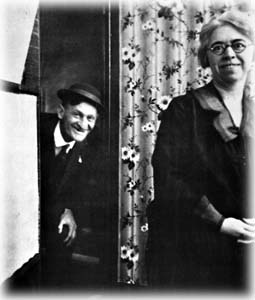![[Metroactive Books]](/books/gifs/books468.gif)
![[Metroactive Books]](/books/gifs/books468.gif)
[ Books Index | Metro | Metroactive Central | Archives ]
Artist Al Yutzfield, 19151997
 Always the Joker: In his heyday, Yutzfield (seen here in a rare tintype from his personal archives) was quite the ladies' man; he told me once he'd turned down marriage proposals from Nazimova, the widowed Madame Curie and Queen Marie of Romania.
A giant of the golden era of superchampions, from Copper Boy to Monsieur Helium, passes this way no more MY OLD FRIEND Alexander Yutzfield died last week. Never again am I going to hear the rasp of his voice as he calls me up to point out the angstrom-wide discrepancy between something I'd written and the truth as he saw it. I'm sure most comics fans--out hypnotizing themselves with the 3D covers of Bloodblister #489--won't have heard of Al. In fact, if anyone knew him, it was as an unkempt old man who used to yell obscenities at the passing cars. But in his heyday, five or six decades ago, it would have been hard to find a comic book that didn't have something by "Al Yutz" in it. Dozens, perhaps hundreds, of kids across the country could have told you all about Al and his invention, the "talking airplane," which was his most enduring gift to the realm of comics. Whenever you see a cartoon panel showing a flying airplane with a word balloon over it reading something like "Next stop--Mombasa!" or "Buckle your seat belts, men--there's rough weather ahead in Future City," remember Al Yutz. "I was on the seaplane to Catalina," he told me once. "It was a bumpy ride, and I wanted to take my mind off of it by solving a problem that had the best minds in the comic business stymied: How to explain a sudden change of scenery? I sketched the Talking Airplane out on a cocktail napkin, and it hasn't changed from that day until this one." AL WAS from Cleveland. His parents wanted him to be a mineralogist. Indeed, he embarked on a course in mineralogy but dropped out of school after only a year. Forsaking academics forever, Al took a train to New York, where he begged a job as an office boy at Weed and Tumbril, America's leading comic publishers. It was the 1930s, and Simon and Siegal's Superman was flying high. Over bourbons at the San Diego Comics Con in 1988, Al told me, "I was amazed. I figured there's got to be a fortune in these 'superchampions.' But what struck me the most was the kryptonite. Here was the drama--in the rock. Not in some jerk with a cape flying though the air." Yutz decided to create drama out of the elements themselves. His first comic, Hydrogen Baumgarden (1939), followed the story of a Lower East Side boy who was able to turn himself into pure hydrogen. Monsieur Helium (1942) portrayed a debonair Parisian police detective whose unique ability to turn his voice high and squeaky left many a criminal incapacitated with laughter--and ready for a date with Madame Guillotine. Working his way up the periodical table, Yutz enjoyed considerable success with Copper Boy (1943). "Red" Penny was a newsboy whose magic one-cent piece turned him into a bronze titan of might and thrift. Yutz scripted Copper Boy comics for 22 years. The series was even made into a movie, of sorts: the 1943 Vespucci Studios serial Copper Boy Versus the Island of Satan. A notorious sequence in which Copper Boy (Bud Prolix Jr.) explains the necessity of internment camps for Japanese-Americans turned up in the 1991 documentary The Shame of Manzanar. Al made the news when he tried to sue the makers of the documentary for royalties. YUTZ'S MANY characters were recently revived in Parvo Comics' noirish Valences, in which writer Alan Poore concocted new histories for Yutz's characters: Lithium Lady was manic-depressive; King Carbon was dating again; and Copper Boy turned out to have delayed stress syndrome from his encounter with the Nazi villain The Smelter. Al viewed all of these newfangled comics for adults with suspicion, but he was obviously pleased with the attention. I wish I could remember all those afternoons we spent drinking and talking. But I can't. However, I won't forget the time I asked Al what he thought of the world of comics he created. What did he think about how a roomful of skinny men in green eye shades had given birth to humongous communications companies with licensed images, dozen of franchises and battalions of lawyers to protect it all? The old man's eyes twinkled as he replied, "It sucks. Now get that microphone out of my face." [ Metro | Metroactive Central | Archives ]
| ||||||||||||||||||||||||||||||
This page was designed and created by the Boulevards team.
Copyright © 1997 Metro Publishing, Inc.